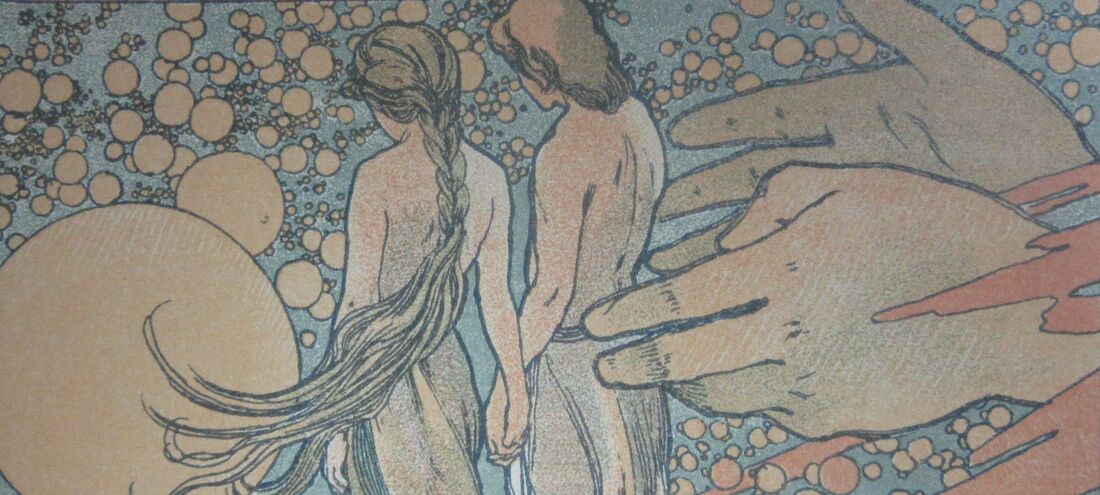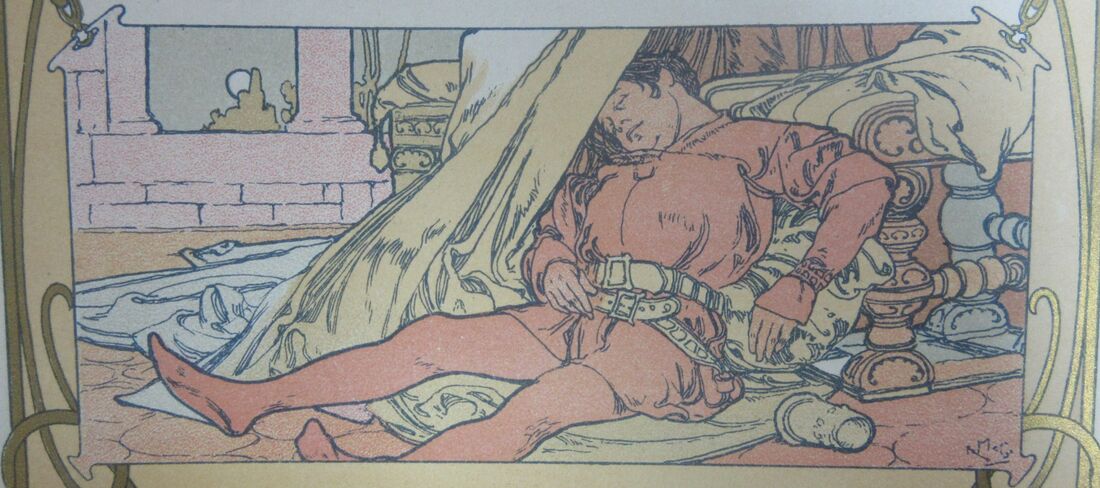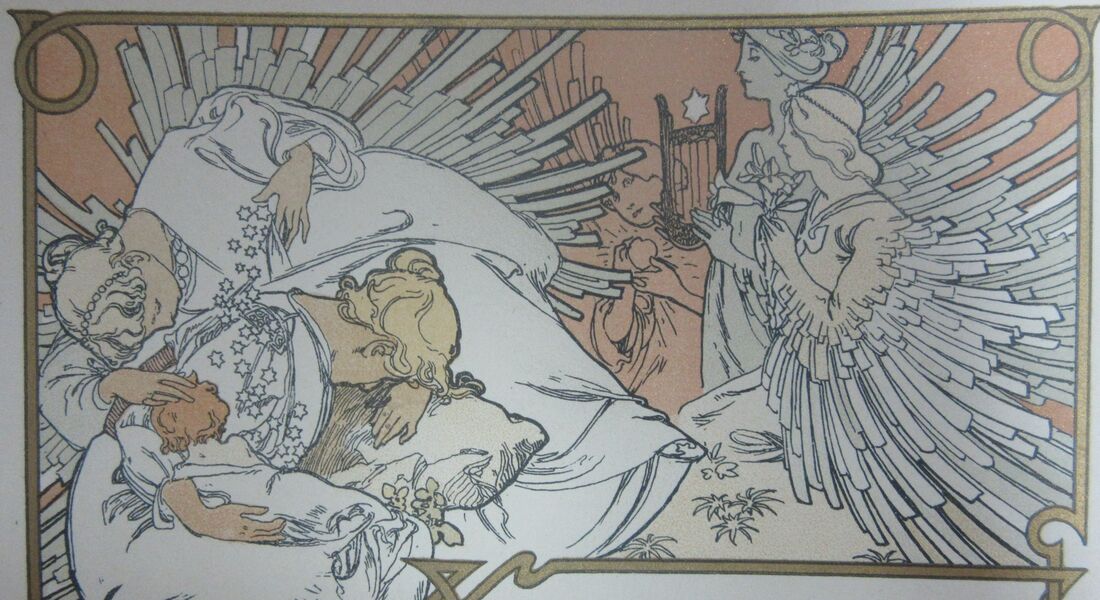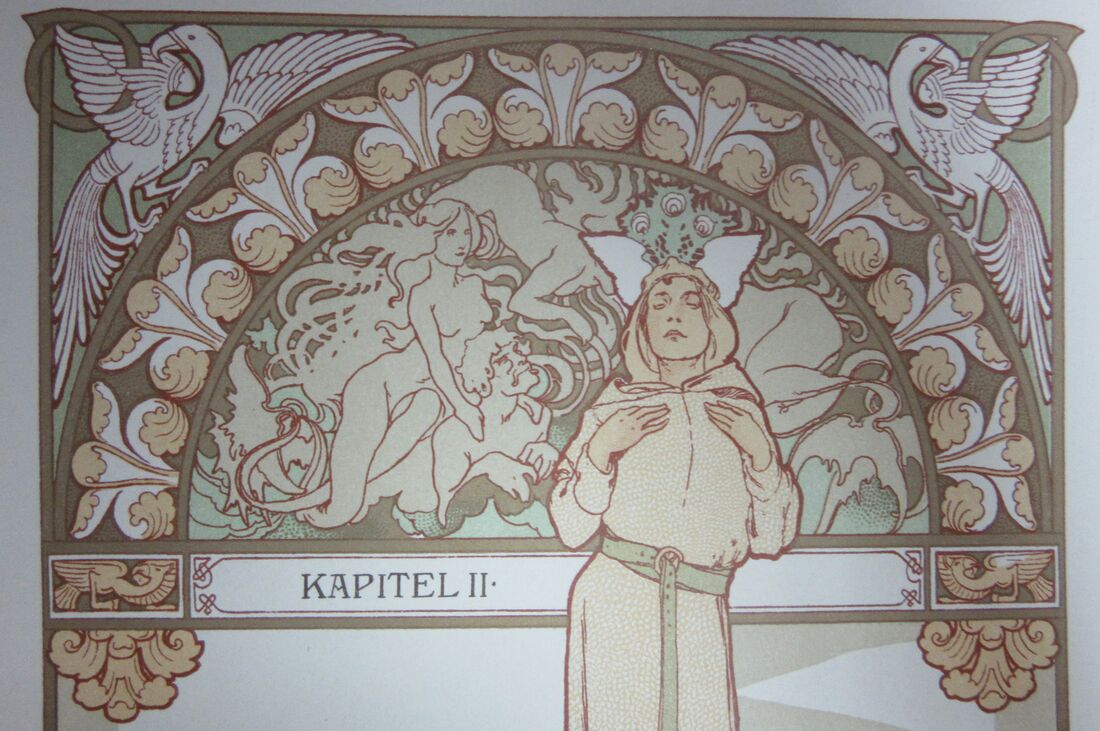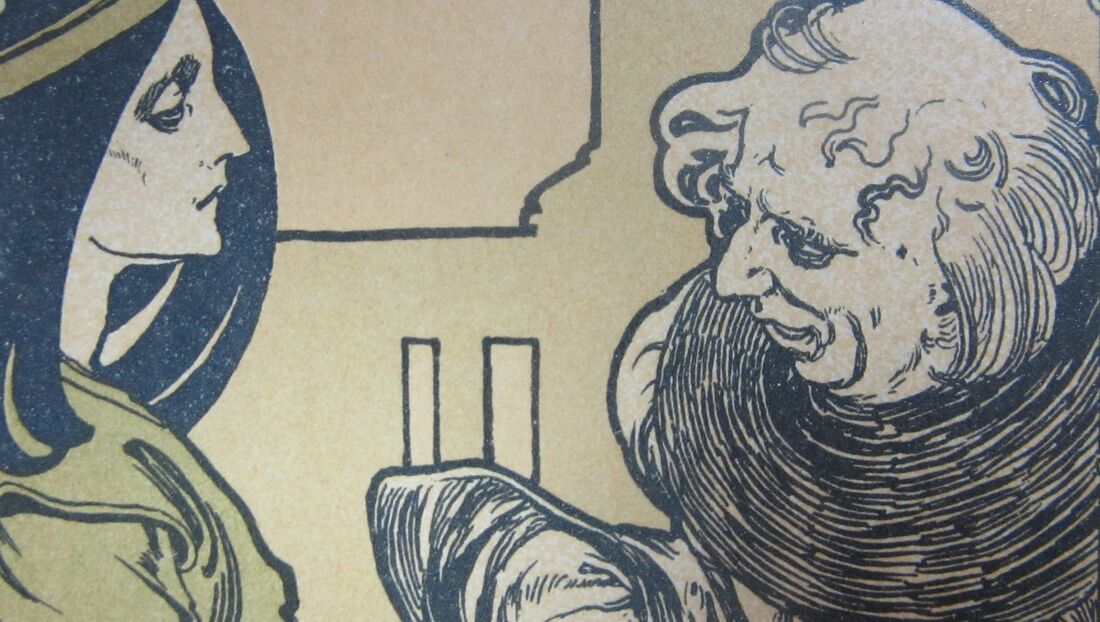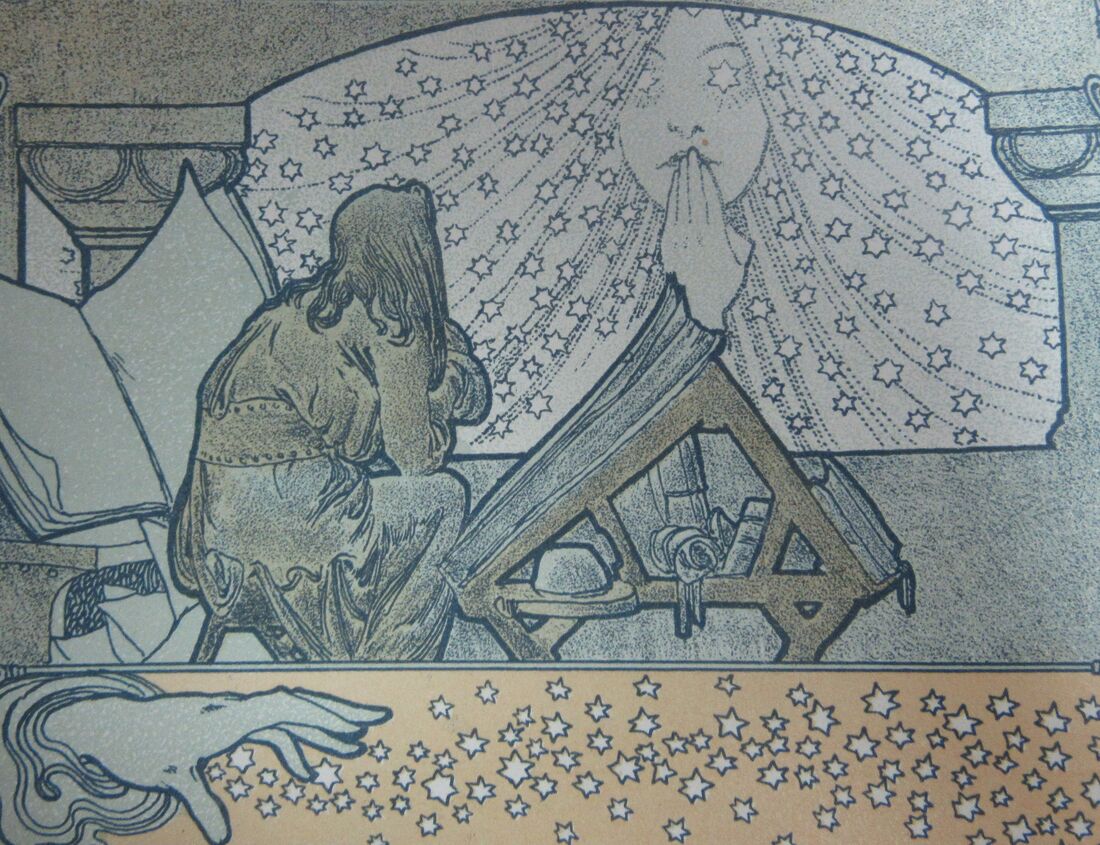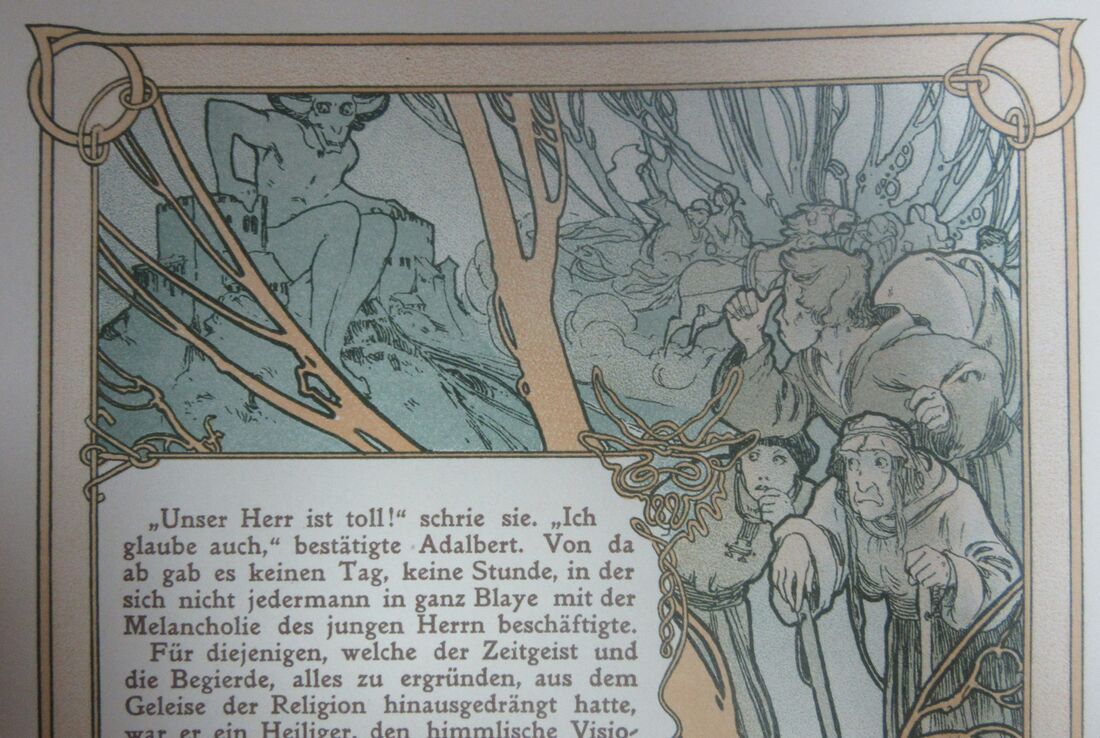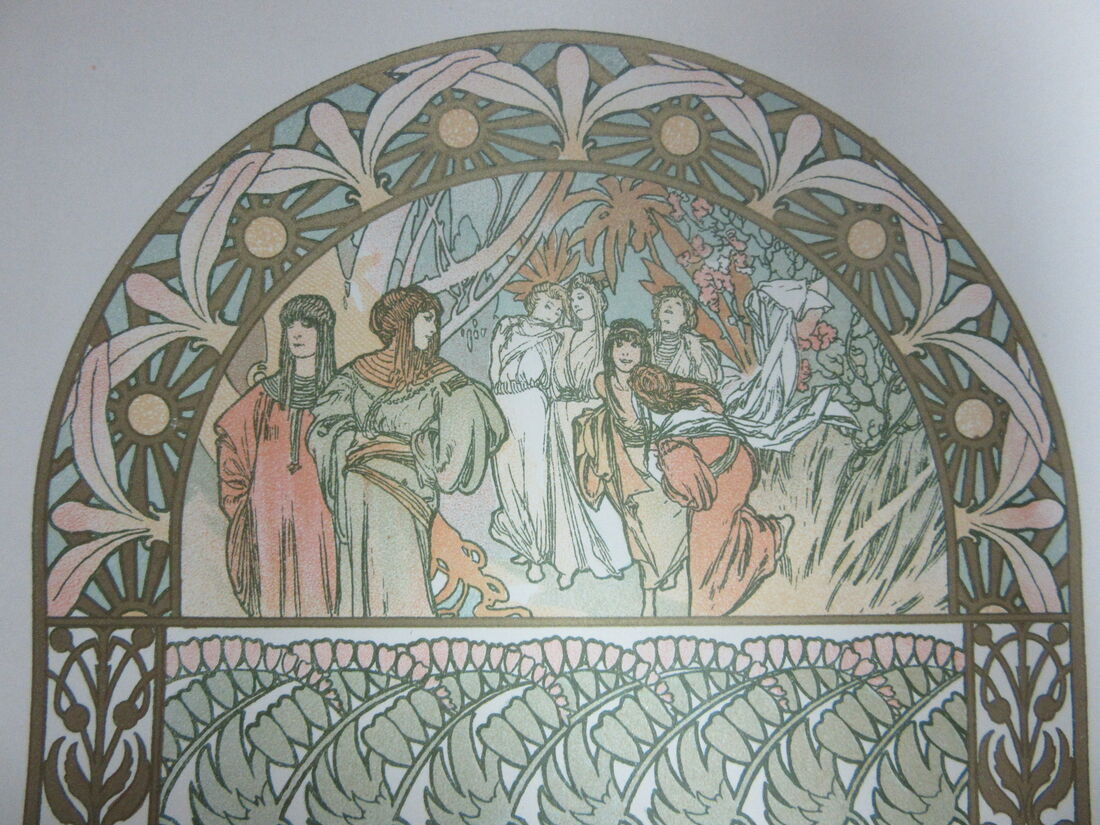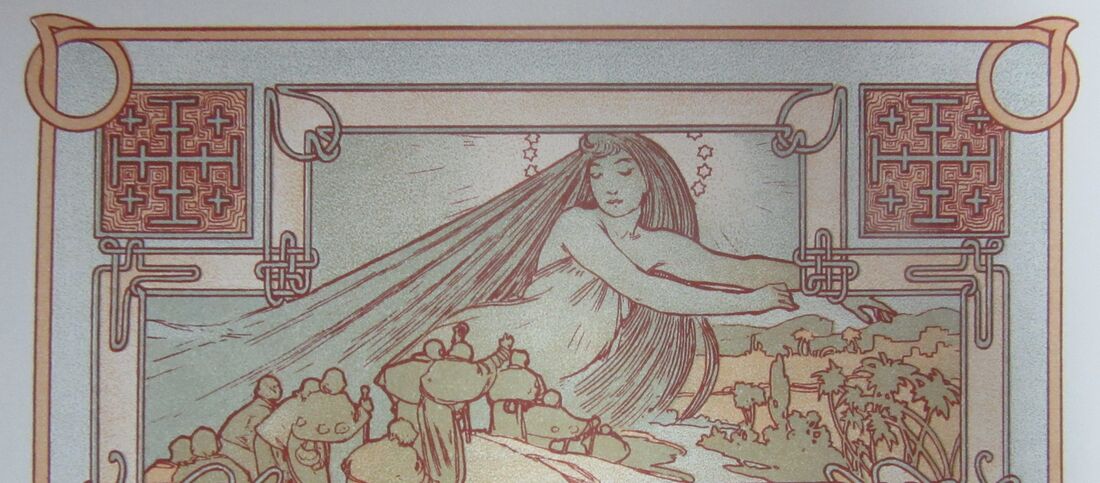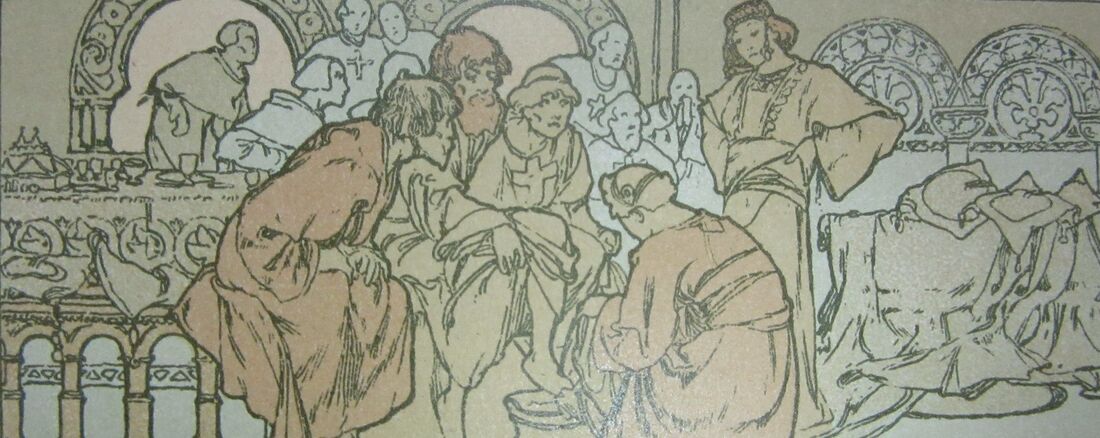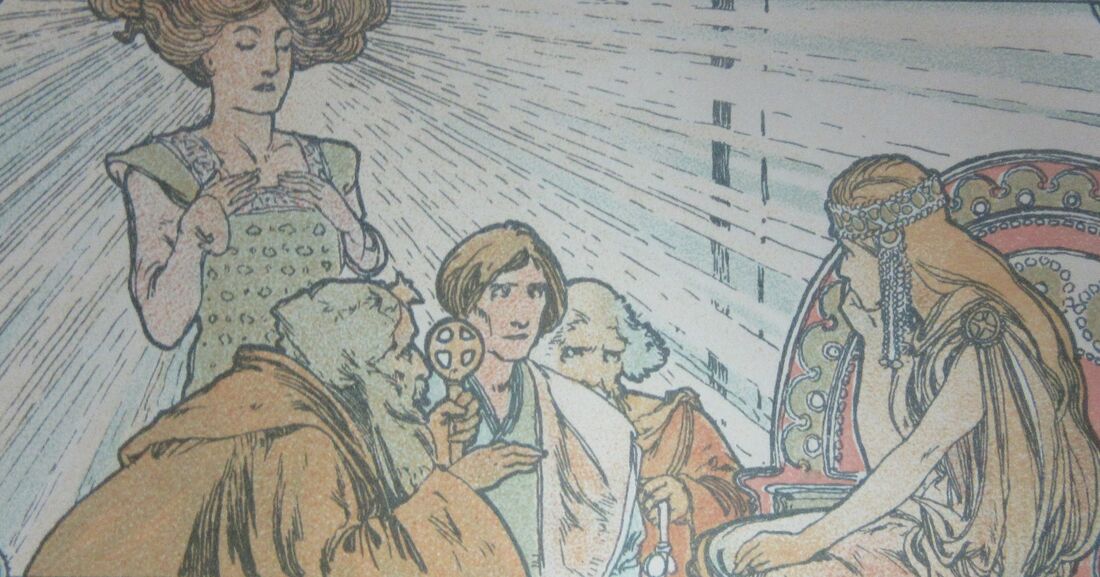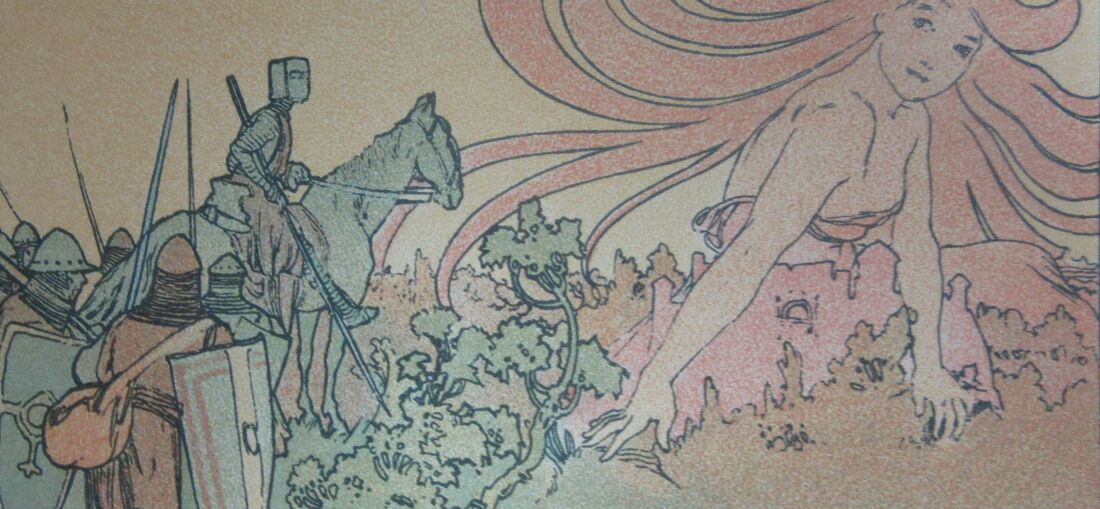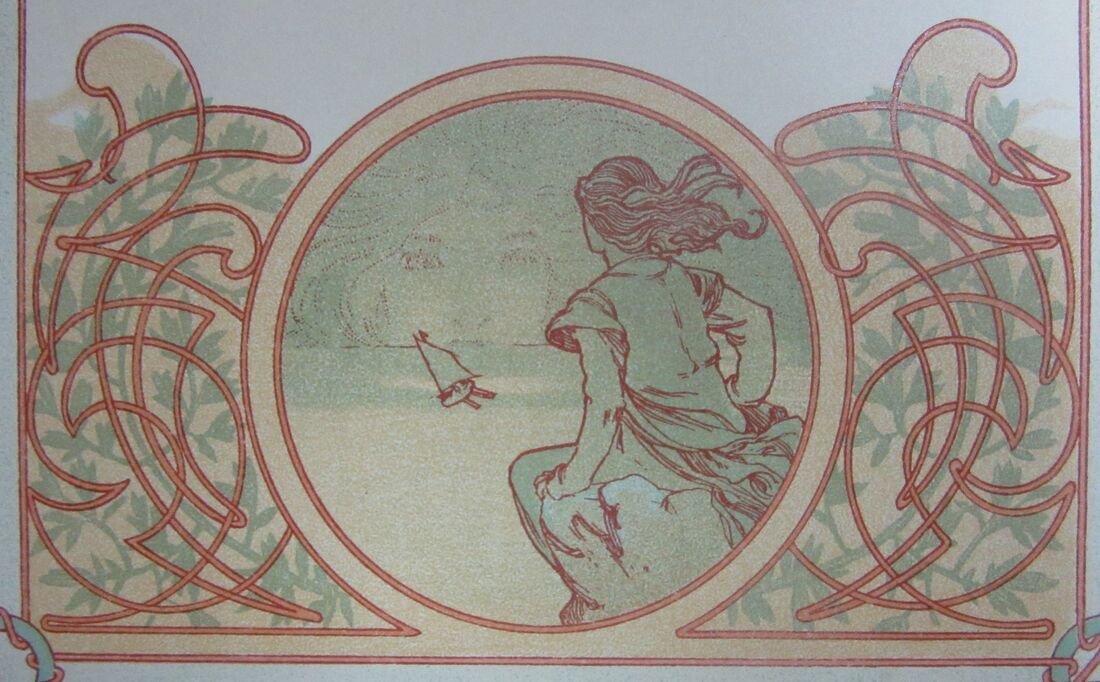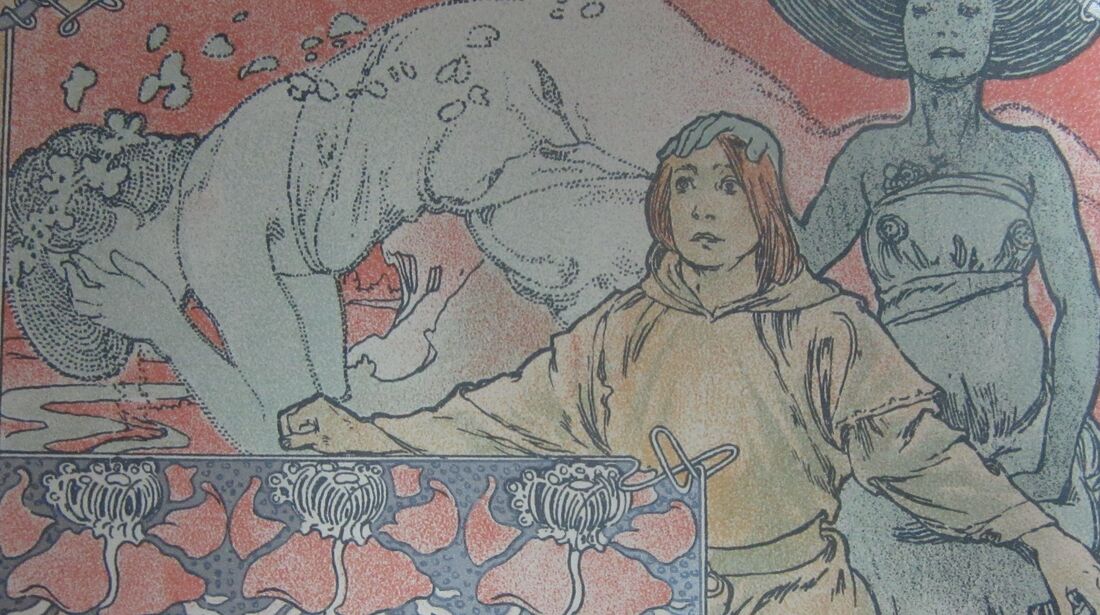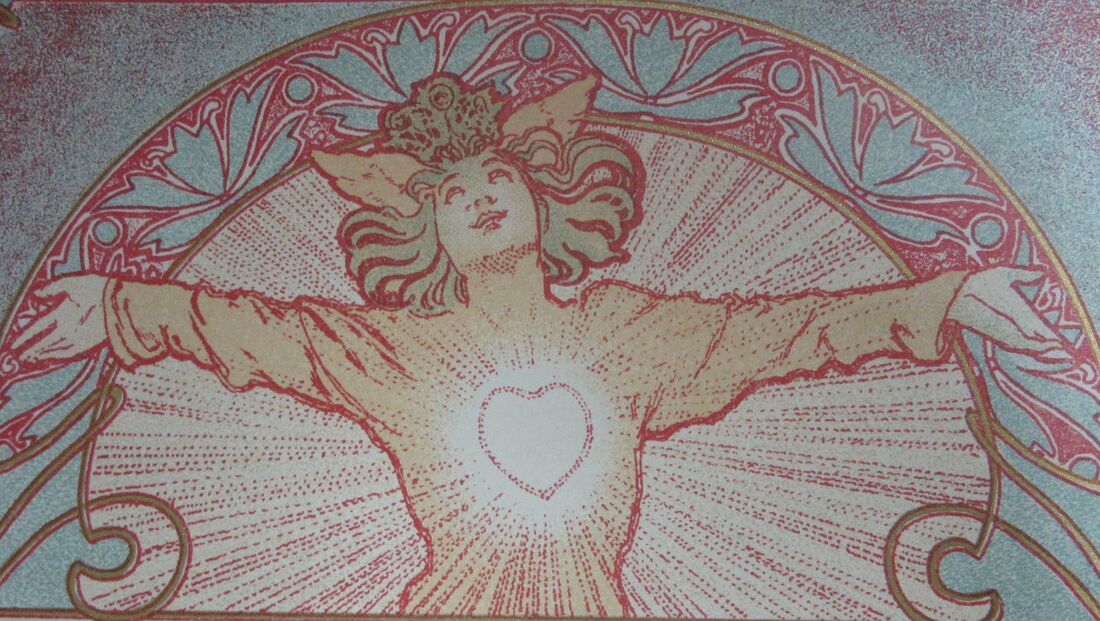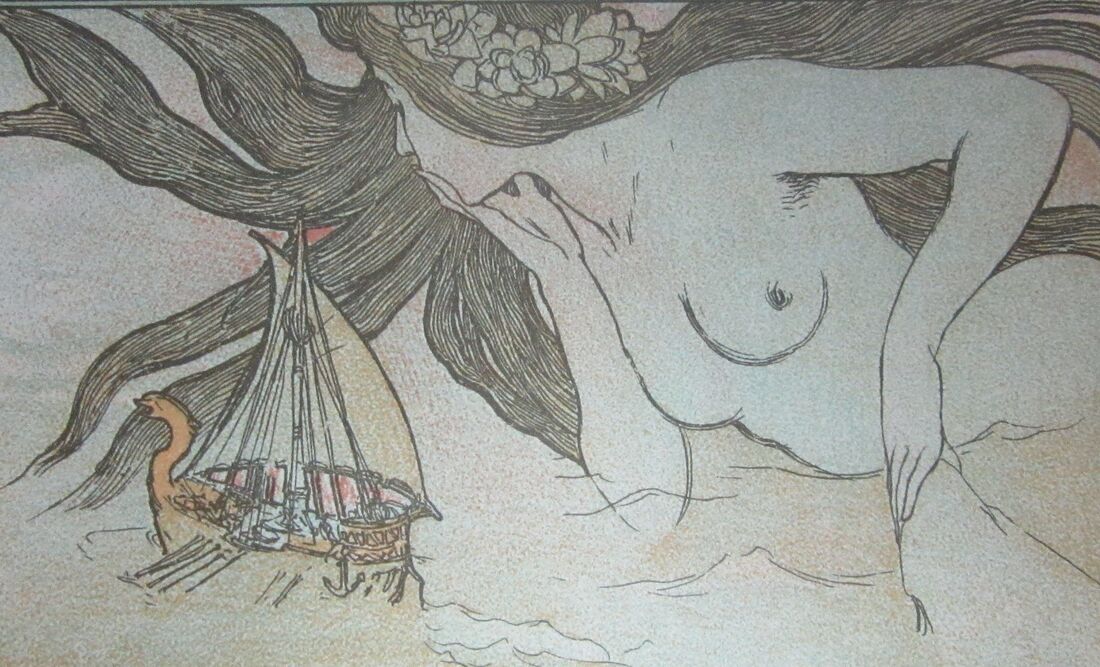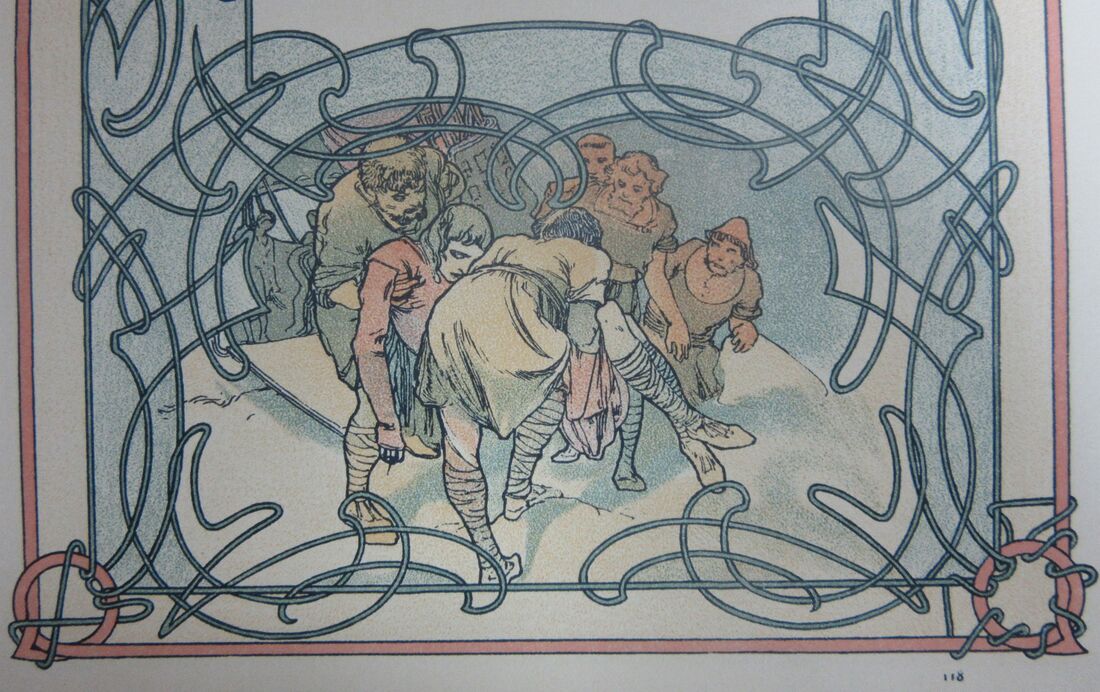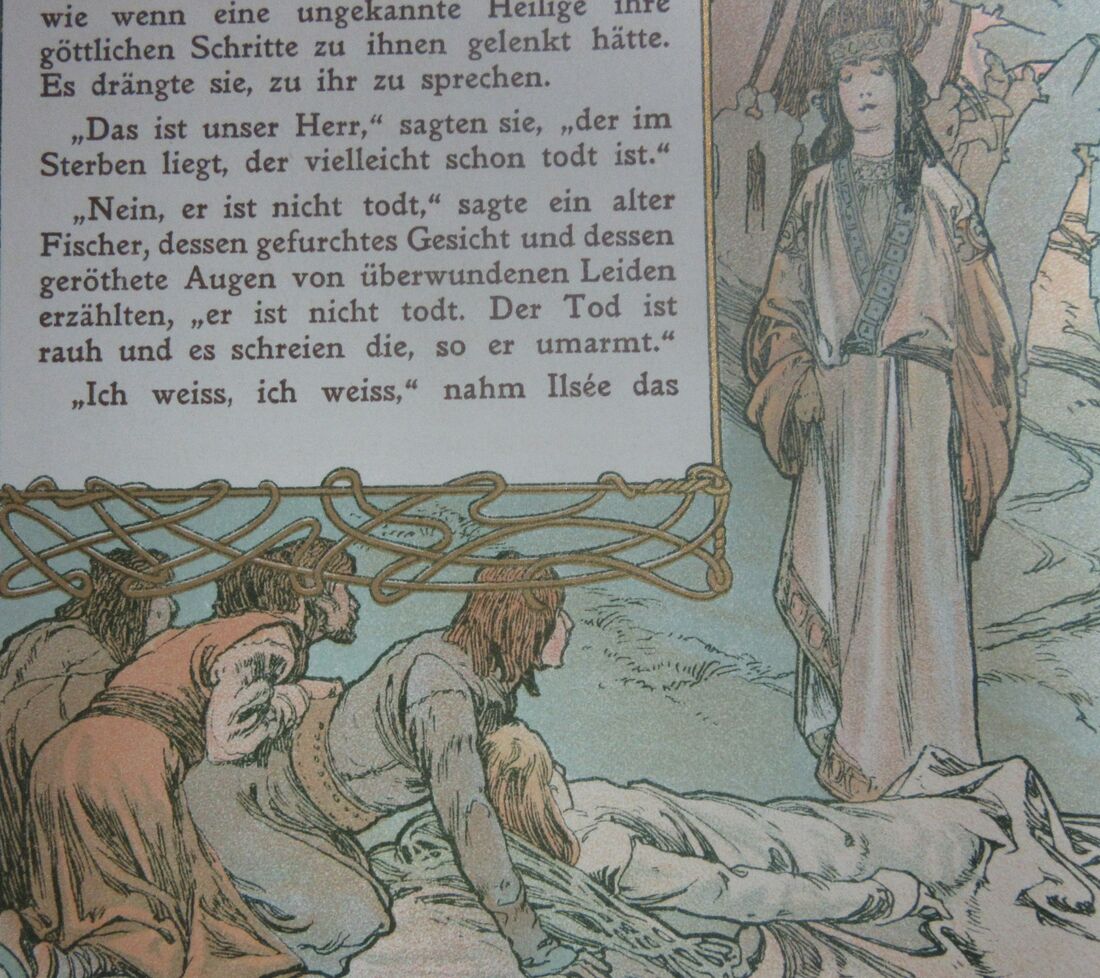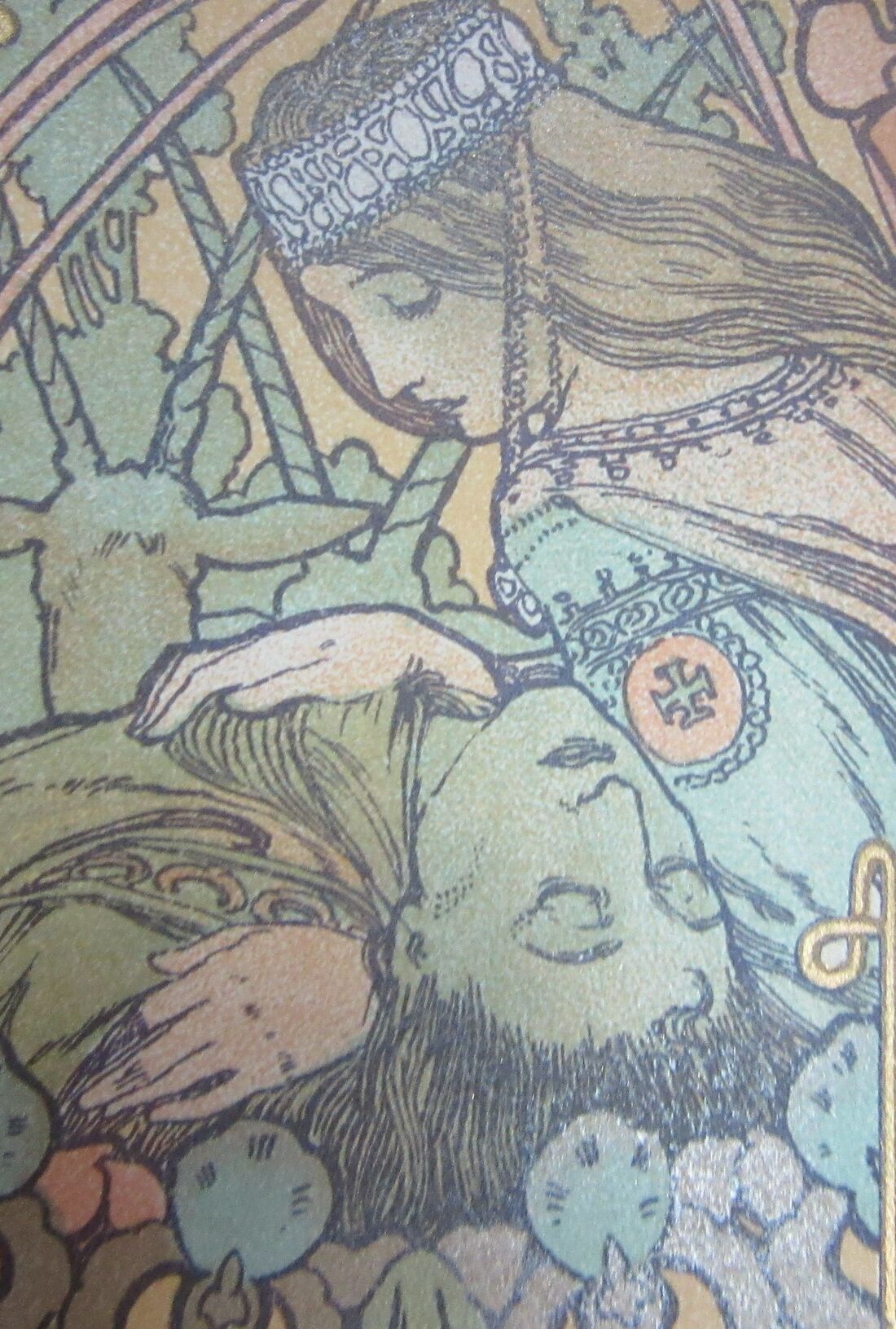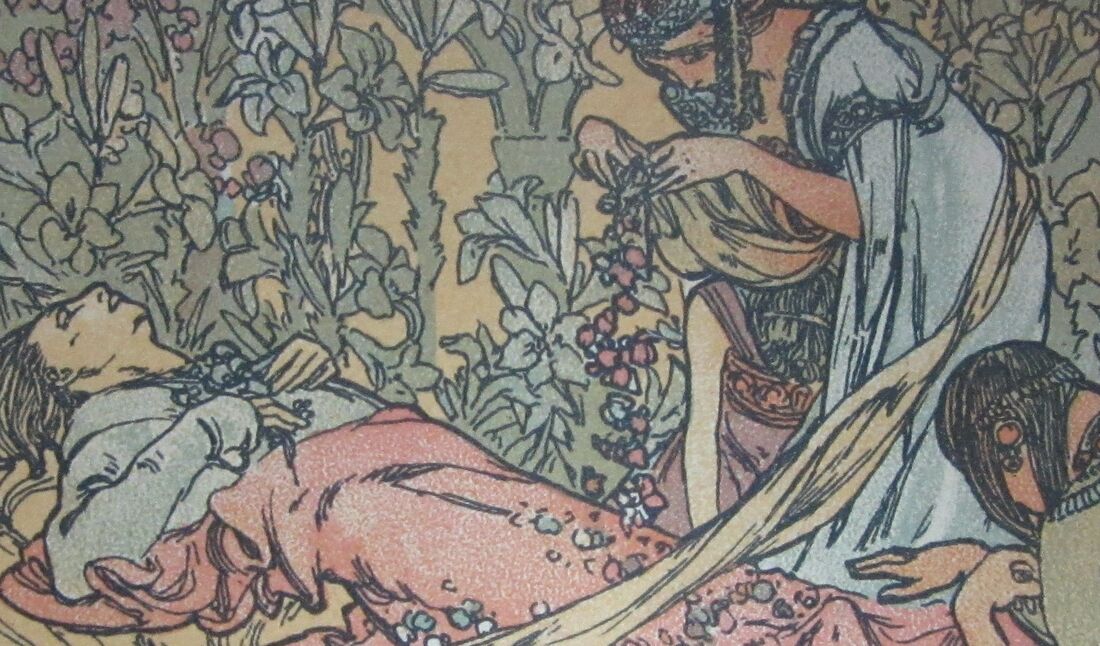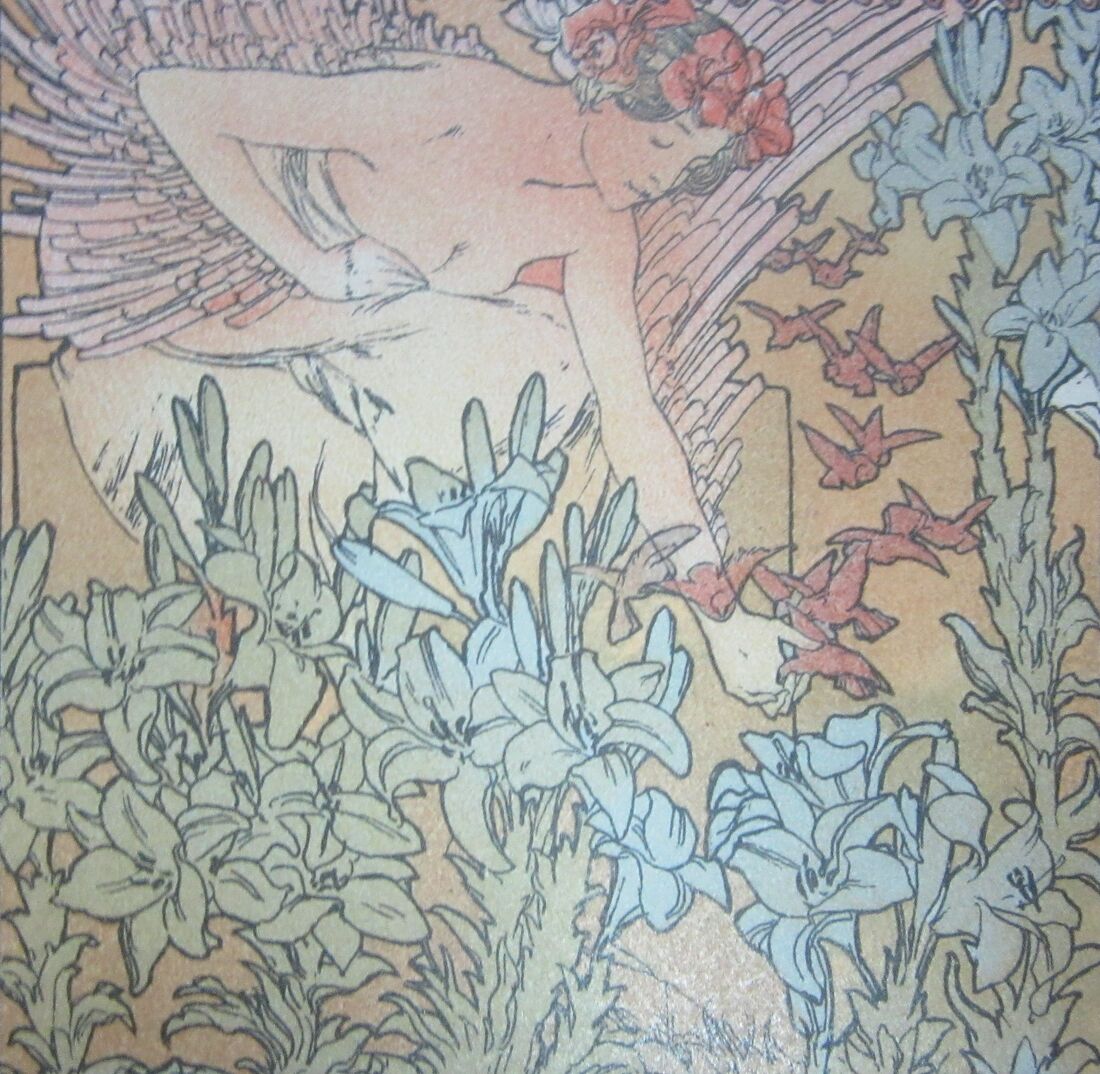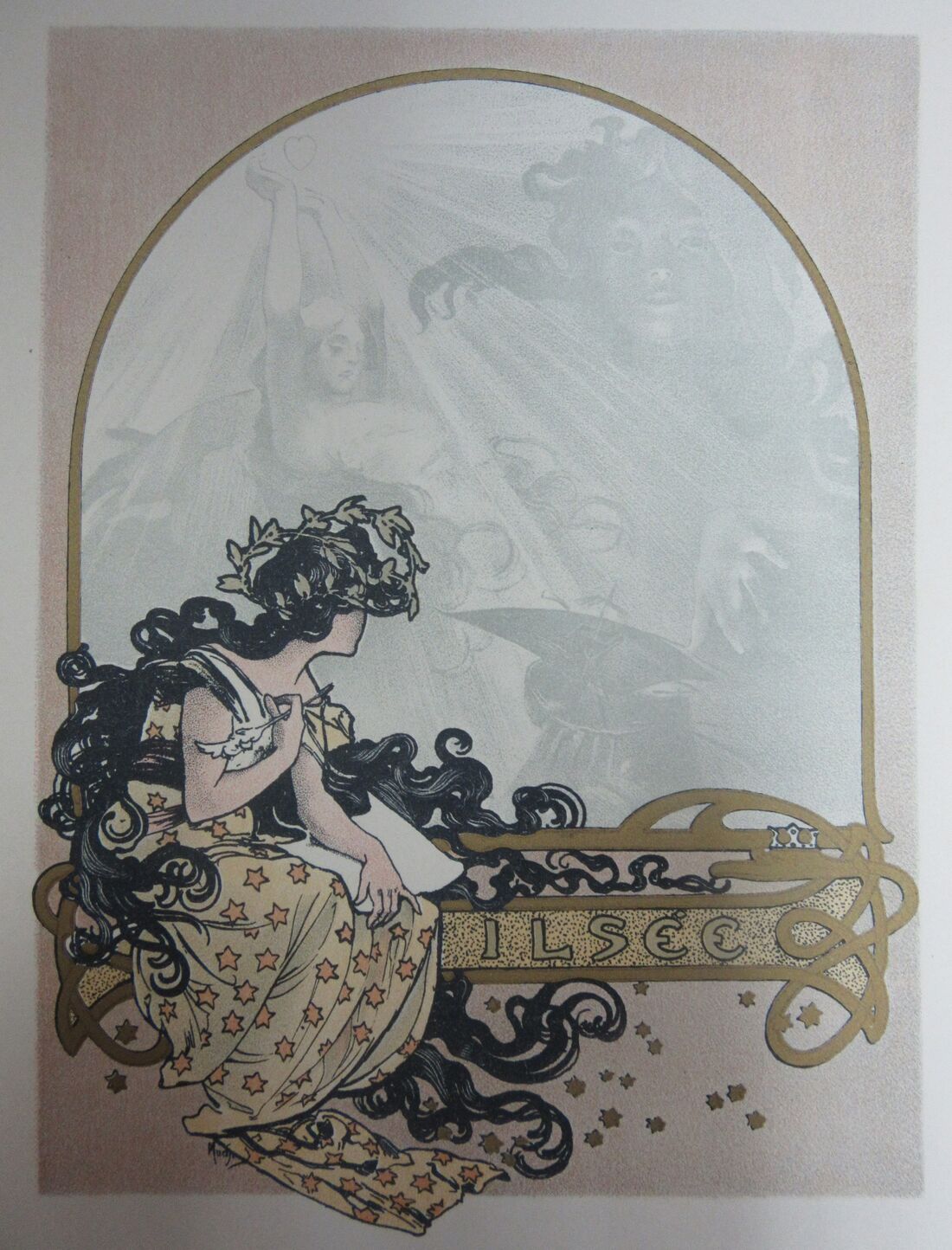Experience the Story of Ilsee, Princess of Tripoli
Alphonse Mucha and Ilsee, Princess of Tripoli
At the end of the 19th Century, cultural conditions were ripe for a decadent re-imagining of a classic love story. In Ilsee, Princess of Tripoli, the story of a forlorn prince and his faraway lover is dreamed to life by the Art Nouveau master Alphonse Mucha.
Ilsee, Princesse de Tripoli is based on an 1895 stage show by Edmond Rostand called “La Princesse Lointaine," or, “The Faraway Princess.” The play featured famed turn-of-the-century actress and model Sarah Bernhardt, with whom Mucha worked very closely. Parisian publisher Henri Piazza commissioned Robert de Flers to create the manuscript for , and he completed it in 1897. It was originally published in French and then translated into Czech and German.
According to the Mucha Foundation, by the time Robert de Flers completed the manuscript for the story, Mucha had only three months to complete the 134 lithographs to illustrate the text. He later wrote: “We worked on four stones simultaneously. I did some of the drawings straight onto the stone. Other things, particularly the decorative edgings, I drew on tracing paper which was then passed on to the draughtsmen who continued the work with the colors I specified. I hardly had time to sketch out the motif for an ornament when they came and took it from my hands and got down to work on it.”
One of Alphonse Mucha's illustrations for Ilsee, Princess of Tripoli
Ilsee, Princess of Tripoli is divided into three parts. The short story begins in a township in France in the early 11th century. Arnaud Rudel, son of the Count of Angouleme (who originally owned the lands of Blaye), was the first of the Rudel family ruling the commune of Blaye. This, and a few other details in the story, is based in historical fact.
The romanticized fictional story begins by introducing the father of the minstrel Jaufre, who is also named Jaufre. Just as the elder Prince Jaufre’s journeys, adventures, and hunts were famous among the Rudel family and their subjects, his love of wine and women was similarly well-known. He was often found asleep in the dining hall under the great wooden table, the scent of wine still on his lips.
The elder Prince Jaufre, asleep under a table.
The elder Prince Jaufre had so many children that the salt and incense of the baptismal font had run out. This, of course, was something of great pride for the prince, as the number of his sons outmatched even the King’s. When he learned the news of his dried-up baptismal font, he was "joyfully moved. He had the overwhelming desire to talk of love to a young shepherdess who had just been hired by one of his tenants.” The narrator then says, “I do not dare to say whether the Lord was content with this.”
Prince Jaufre was quite enamored with this young woman. The narrator goes on to say, “Clarette, the young shepherdess, brought a boy to the world a few months afterwards – precisely as time cannot say, since the poet worries about the contradiction by the mother of Clarette…who thought she had become the grandmother of a little angel. … Deeply moved by this event, Jaufre decided to give the child his own name. He went to his wife, whom he remembered only on very rare occasions, and begged her to accept and take care of the little boy as a son. But she refused to agree, as she feared there would be a considerable disadvantage for her own son Gerard [the rightful heir] and her daughter Eymardine." The elder Prince Jaufre decided to take matters into his own hands. Both his wife and Gerard died soon afterwards of a mysterious disease “whose name cannot be ascertained.”
Prince Jaufre continued his debauchery until the wine ran stale and dry. On this day, he suddenly felt old and bored. Unexpectedly thinking of somebody other than himself in this moment, he asked his honorable priest Prior Adalbert and the scholar Ebler to summon Jaufre and Eymardine and tell him how they were faring. The two returned a while later to find the elder Prince Jaufre asleep in his chair.
The maiden Clarette holding the young infant Jaufre
The prince demands information about his son, asking “whether he is brave about his sword...whether he makes ample use of the friendliness of the girls and women...whether he be worthy of his father.”
The priest then reveals the unfortunate reality: “Jaufre is an accomplished rider...he leads the sword just as his captain, but he avoids every opportunity to show his youthful strength in fighting and playing…this is the reason why your son, my dear young student, frightens me. He likes to be alone for a long time, the company of men is displeasing to him, and the women seem to frighten him. The maidens call him the “seraph,” and the young men, less cautious, call him “the virgin,” with impious disrespect…”
The young Prince Jaufre.
Ebler told him that he had found young Jaufre sitting on the beach and speaking to the stars. He emphasized Jaufre’s strange fascination with nature and other melancholic things. The prince angrily bid them find Jaufre and bring him in.
When they do, the prince scolded his son, who had tears welling up in his eyes. He said: “My son...the life you were driving is necessary and empty. You are afraid of the competition at the tournament and more, so I was told, the soft curls of beautiful girls. This is an affront to manliness to which I must scold you. You are as sensitive as a woman.”
Young Jaufre (left) and his father (right).
Young Jaufre attempted to explain himself to his father, saying that he instead spends his time in nature, taking walks, writing prose, and reading books. His father was not at all pleased—even extremely confused—at this answer. They continued to argue as three young musicians started to play in the room. They sang a melancholy song as the divide between father and son grew larger with every exchanged word…
Even as Jaufre reached the age of 21 and his father died, he maintained his nature. He frequently spent time in a hut in the woods where all the flowers grew instead of in his palace executing his princely duties. “Above all, he loved the flowers…his dreams, the most beautiful as well as the most terrible, were always full of flowers…Jaufre had made the vow to be a faithful, eager protector of the flowers for all time.” This was how he spent his time—tending to the gardens and watching the stars.
Prince Jaufre studying the stars
Even so, the young Jaufre did not feel happy. He did not feel love; he did not understand it. “Who will it be,” thought he, “who teaches me the unknown without his secret being lost?” As the months went by , Jaufre’s sadness grew, and the townsfolk grew ever more concerned about their prince.
At the end of the first part, Jaufre welcomes a group of Spanish women, captured from their homes by the Catholic knights of the second crusade, into the castle. He eats with them and blesses them. This sympathy towards the Islamic women sparks public outrage against Jaufre. His increased dejected melancholy also contributed to this concern, and made many believe that his castle and his mind were inhabited by hellish demons. Prior Adalbert suggested that he send pilgrims to the holy land of Tripoli and Jerusalem—the promised land—so that the pilgrims might appeal to God and his wrongdoing may be forgiven. This, they thought, might cure Jaufre of his depression and set Blaye back on the right course. Jaufre accepted this suggestion, and the pilgrims set off for Jerusalem.
The townspeople began to believe that Jaufre's castle and mind were inhabited by demons.
Part two begins with the introduction of Ilsee’s followers. They bathed in the sea waiting for her to arrive and gossiped about her extraordinary beauty, who she might marry, and her melancholic weeping. Then, she appeared in a horse-drawn carriage. “Oh, this look, to which the earth was not worthy! … What charm would be equal to the indelible charm of these eyes...?” She confided her sorrows with Djeldah, a close confidante, who asked if she was sad because of the horrors of the war her father was fighting. She responded. “I do not fear the war, Djeldah; the war can be noble… My father, whom I love because he is my father, will compel me to choose a husband.” Ilsee is unsatisfied with the prospect of an arranged marriage, and prefers to make her own decisions. They ride towards her home.
Ilsee and Djeldah arrived back at Ilsee’s palace in the middle of an oasis, surrounded by beautiful flowers and fauna. It was here that Ilsee made her home—away from her father in the city.
Ilsee and her entourage arrive at her oasis.
As Ilsee entered her palace home, she was approached by a slave who told her of her awaiting guests—her father and three strange gentlemen to offer her for marriage. Her father spoke: “consider these three gentlemen…you may freely choose among them. All three are the most honorable knights in the world, and have everything to satisfy your wishes and your whims."
They introduced themselves one by one: Erdelius the wise, Eldenias the clever, and Hilderich the warrior. Ilsee denied each of the suitors, the gentlemen left, and her father demanded a choice by the end of the night. She refused, and professed that the man she will fall in love with and eventually marry will “be weak, full of pain and full of suffering."
Ilsee appeals to her father.
Her father threatened her once more, comparing her to the witches he has burnt in the market of Tripoli. After this she relented, saying that she would choose one of the three soon…unless somebody else came to ask for her hand instead. Her father was satisfied with this because her oasis palace was hidden and not on the path of many pilgrims. Not one minute later did voices echo through the chambers, requesting urgent help. Djeldah announced their arrival to the princess, who, filled with a new hope, cried to let them in.
The pilgrims from Blaye met Ilsee and fell to their knees. She welcomed them with gentleness and goodness and they were in awe. They proclaimed, “She is more beautiful than our dear wives at home…her eyes have the color of heaven… her voice is sweet as the morning wind.” Ilsee brought them food and drink, her servants washed their feet, and she asked them of their home.
A spirit or force of nature leading the pilgrims to Ilsee's hidden oasis palace.
They told her of the troubles of their journey to go to the tomb where Christ was buried. The eldest of the group began to weep. “I weep because the Lord has not found us worthy of the grace which we have searched for on the sea,” he cried.
Ilsee was confused. “What did your prayers desire?” she asked. They replied: “the pleading of our hearts did not ask for a favor for us. It is another man for whom we have taken the journey; it is our young master, whom a supernatural phenomenon pursues, in the dark hours of the night, as in the bright hours of the day.”
"Speak, tell me of your lord," said Ilsee.
Ilsee and her servants receiving the pilgrims
They describe Jaufre. “He always seems to look far beyond earthly things; he does not appreciate the wealth that surrounds him; he avoids the pioneers of his old castle and dwells on the banks of the pond, in which the water-roses bloom…he spends his days and contemplates the trembling mirror of the water…We had gladly given our lives to bring him the remedies against that unknown disease..."
“The princess was embraced by a new heavy dream; she replied to the pilgrim's speech only with mysterious laughter. Then she went into the chariot drawn by white horses, and accompanied the pilgrims to the sea. She saw them climb the ship... She stood on the coast, so close that the billowing waves covered her feet with white foam, long, long after the tallest mast had already disappeared, and looked out over the unfathomable sea. And farther and farther, the horizon seemed to recede and lose itself in new heavens, over which their dreams floated in the stars.”
Ilsee hears the tales of the pilgrims and imagines the faraway, melancholy Jaufre.
Part three resumes the story back in Blaye. Jaufre’s mind-demons had begun to produce visions of a beautiful woman who he falls in love with. This vision, sometimes appearing to him as if somebody were actually there, convinced him to try his luck in war and the Crusades. He wanted to prove his bravery to this vision. For six months, all anybody could talk about in Blaye was Jaufre’s success in the war—fighting Angevins and Normans and Hungarians.
Even through his victories, though, Jaufre remained humble. He did not follow his fellow soldiers to the pleasures of love—he did not want to upset the “suspicious mistress” that gave him hope for the future. As the fighting grows longer, though, his dreams of this woman cease. After a particularly bloody battle, Jaufre paused to cry out against his dream-woman: “Why has thou forsaken me in this sad hour?”
A benevolent vision watches over Jaufre
She appeared to him and spoke for the first time, and told him to return to his castle and cease his fighting. Jaufre noticed that her veil was covered in blood and the rocks upon which she stood were piled high with corpses. She left him without another word, and Jaufre left the fighting to return to his castle, much to the surprise and disappointment of his subjects.
As soon as he returned home, it was clear that he was unwell. Despite even the best healer’s efforts, he did not begin to recover. “It was a heartbreak for all those who came to his nearness to see his pale decayed face.” He remembered the still missing pilgrims and they added to his worry. “The stormy sea has perhaps devoured them, or the careless first mate has lost the leading trace of the stars.” Jaufre sent messengers to the shores daily to watch for the returning pilgrims, and when they came back with no news Jaufre’s sadness was once again renewed.
Jaufre waiting for the returning pilgrims.
When the pilgrims finally returned, they feared the prince’s reaction. Not only did they bring tales of their constant suffering on the journey but bad tidings and omens for the prince. “’Lord,’ said the oldest of the pilgrims, ‘…I am deeply grieved to announce to you that the Lord remained silent when we came to him asking for the grace of his light for you.’ Jaufre seemed to feel no disappointment. He asked his faithful envoys to tell him of their long journey. They did it with reverence and modesty: they spoke of their pious enchantment during their dwelling at the holy grave, they praised the beauty of the morning-land heaven, and the mildness of the many nights of stars. Then they reported how, on their return, the winds and currents of their ships drove their ships to the coast of Africa, and how they were received by a princess of Tripoli.”
“They described with enthusiasm, and their speeches betrayed inexpressible passion and sacred fervor, which still glowed their hearts in memory.” They told him of her beauty, of her oasis, and of her kind hospitality.
Jaufre remembers the woman of his vision and is told of the beauty of Ilsee.
“An immeasurable joy painted in Jaufre’s face. Now he knew the names of those who lived in his heart for so long. She lived, surrounded by clear light, on a distant shore, and he will see her! And he felt full of confusion, the joy of uncertainty, of reality, without forgetting the suspicious sadness of the dream.” His love was true!
“’Now I will go out,’ cried Jaufre. … ‘My life will soon be over, but I will follow the fate that has marked me…’” He decided to set off for Judah and then allow destiny to take him where it can. The next day, he said his goodbyes to his servants, family, and subjects. He left on a boat with other members of the Crusade. They set off into the evening: “The azure of the sky mingled with the mauve and rose-red inks of the high mountain peaks…The wind was swollen with the fragrances of the oleanders and of Jasmine…Jaufre felt his powers dwindling and quietly contemplated the sky and the sea.” Peace began to wash over him as the boat sailed to his faraway love.
Jaufre's heart singing in joy.
“Everything between heaven and earth sounded together to a hymn to the mysterious princess.” They continued towards Judah.
Jaufre’s condition deteriorated rapidly. He “soon refused all the food which was offered to him. He did not respond to the questions addressed to him, and seemed to have lost the use of language. Nevertheless, he sat for hours, his eyes fixed on the east, where the rising sun broke through the clouds.” The whole crew could feel his death approaching.
The wind, personified, directs the pilgrims and Jaufre towards Ilsee.
Then, “Suddenly the wind was changing, and the boat was driven to the south without any control as if to…bring the poor gentleman to the oasis where his dream lived…after a few hours the ship landed, and on their strong arms the sailors carried the lifeless body of their master to the beach.”
Ilsee came to the shore almost immediately. The crew began to identify themselves, but she interrupts, “I know, I know… that is your master; he is good and mild and comes from distant lands. His eyes are closed and I have never seen them, but I know his eyes; they are deep and gentle like those of the sea in the dreaming hour of twilight. For a long time since the day when the pilgrims have visited my house, guided by the friendly power of the wind, I see his still image…Let him sleep…For a long time I have known him; for a long time, my thought has grown like a flower of hope over him. Do not wake him. It is he, the friend of my soul.”
Jaufre's attendants dragging him to shore.
They brought Jaufre to the hall of Ilsee’s palace where flowers had been prepared for him. Suddenly, Jaufre opened his eyes. “’Oh, Mistress of my dream, Oh, Mistress of my dream, it is possible for me to be so blessed! The thought of you never left me, and the hope of finding you has never left me. For us, these words had the same meaning, distrusted by no remorse, for we are not repenting what is dreamed, for united we find ourselves again...Princess, I feel it, you are my sister in the most sorrowful pity, and my eyes are fixed upon your own eyes, as the eyes of these good sailors, who surround me, dwell in the stars when the night came. I am at the end of my dream...’"
Ilsee meets the pilgrims and the dying Jaufre.
Jaufre's soul was wonderfully refreshed in her company. Then, "when death came, he rose with his last strength and his soul breathed the soul of the flowers which he so dearly loved, and his lips touched the lips of Ilsee. And his life escaped.”
Jaufre dies in Ilsee's arms.
She brought him flowers, saying, "They spoke to me of your sorrows, they implored me to love you, and they revealed to me your heart and your soul. I’ll bring you roses and violets.’” She buried him in a tomb, where flowers sprouted endlessly.
Ilsee buries Jaufre in a tomb of flowers
Back in Blaye, people awaited the return of their prince. As the years went on and he never returned, Eymardine, now the noble in charge, allowed the castle to break down into the moat that surrounded it. One night, she decided to visit the hut that Jaufre had once called his home. To her dismay, “the window-pane was broken, the flowers disappeared, and there was nothing but debris and dust.” It seems that the flowers had left when Jaufre left. She lived in melancholy until “death closed her eyes to eternal slumber.”
An angel tending to Jaufre's garden.
While Ilsee, Princess of Tripoli is a fictional and romanticized story, it has roots in actual events. The real, documented Jaufre Rudel was inspired to go on the Catholic Church-sponsored Second Crusade against Islam after hearing of the beauty of Hodierna, the countess of Tripoli. Even before he embarked on her journey, he began to write songs of his “Love from Afar,” as you have just listened to.
This trope, sometimes referred to as “amor de lonh,” was in fact introduced and popularized by prince Jaufre. In the past, this faraway romantic longing was seen as a purer expression of love and, as some might argue, a way for poets and artists to express their desire and longing for women without doing wrong in the eyes of God. Even today’s popular culture—contemporary romance movies, for example—sometimes rely on this idealized form of love that is, at least for a time, tragically unfulfilled.
It is clear that Alphonse Mucha was a master illustrator—his lithographs brought something new to the story of the “Amor de Lonh,” the love from afar. Jaufre Rudel would be amazed by Mucha’s visual interpretation of his life.

